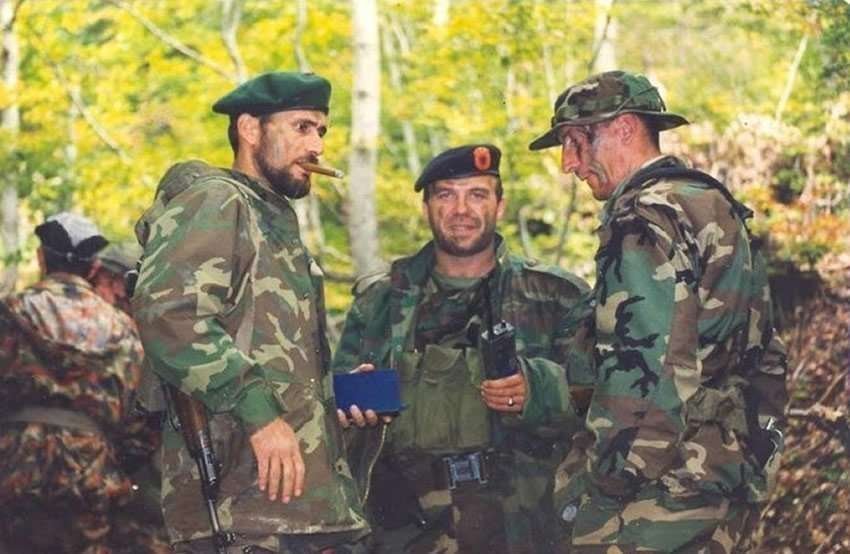The Battle of Koshare, fought on April 9, 1999, as part of the “Arrow” operation, is one of the bloodiest and most heroic battles of the Kosovo Liberation Army (KLA), which managed to open the Kosovo-Albania border.
Breaking the border at Koshare not only marked a significant moral victory but also practically enabled the supply of the war with weapons and ammunition.
The wartime removal of the border between Kosovo and Albania also had legal significance in international law. This prevented the Serbian forces from controlling the territory that divided a single nation, eliminated the violent state influence, and the claimed territorial integrity.
The Battle of Koshare remains one of the KLA’s most successful engagements not only because of the enemy’s casualty count but also for the impact this operation had on increasing the population’s trust in the KLA and its allies.
This battle was a cause for the motivation of many volunteers, who joined the KLA at the front after this battle. The 128th Brigade led the battle at Koshare, commanded by Agim Ramadani, who, with his soldiers, managed to tear down the nearly century-old wall placed between Kosovo and Albania.
Now, nearly 25 years later, reflection on this significant and historical battle for Kosovo continues.
But, is Kosovo today what the fighters and martyrs of Koshare would have wanted?

Firstly, he described the Battle of Koshare as one of the greatest historical values of the Albanians, for which he listed five reasons.
The Battle of Koshare has great historical values:
First, by removing the infamous stone that unjustly divided a people and an Albanian territory, the border of divisions, tragedies, and great pains for the Albanians was completely cleared.
Second, the first Commander of the Army of Kosovo, Salih Çekaj, together with Adem Jashari, Ilaz Kodra, and 29 other soldiers, broke this infamous iron border on 12/02/1991. Salih Çekaj was one of the most glorious commanders of the Battle of Koshare, thus here was the continuity of the institutional war led by President Rugova, 1991-1999.
Third, the criminal Serbian army suffered significant losses in technique and soldiers.
Fourth, it was proven once again, as in the Battle of Loxha, when professionals, officers of the KLA plan and command on the battlefield, success is guaranteed.
Fifth, when there is unity and foreign ideologies cannot penetrate within the professional military organization, success is inevitably,” explained Sali Çekaj’s former comrade-in-arms.
Furthermore, Tahiraj emphasized that this event is remembered with pride, as one of the most important in the last war in Kosovo, where Albanians marked a great victory over the criminal Serbian army.
“The Battle of Koshare is remembered with pride as the most important event of the last war in Kosovo. Our glorious army, commanded by professional officers, won over the criminal Serbian army, even though it was much larger in number and better equipped in weaponry and technique. It is remembered with great sorrow for the heroic fall of all those commanders and brave fighters on the field of honor. They are the strong foundation upon which the state of Kosovo stands,” he stated.
Among other things, Sali Çekaj’s former comrade-in-arms believes that Kosovo, although moving forward, is still not what the heroes and martyrs of the nation fought for.
He called for the future, for all of society to reflect and correct the mistakes made and not to repeat them.
“Kosovo has moved and is moving forward in all directions, even though with great difficulty. These difficulties are being continuously brought by political leaderships, which are not doing their job properly or not doing it at all. This is not the Kosovo for which the heroes and martyrs of the nation fought. They would have wanted to see Kosovo differently, without corruption, with quality education, with a developed economy, without radical Islam, respecting the Constitution as a secular state, respecting the law, and with a functional justice. Every time the anniversary of the Battle of Košare and other anniversaries come, all of society, especially the power, should reflect positively, correct the mistakes made and not repeat them.
Eternal glory to the heroes, martyrs, and all those who sacrificed their lives for the freedom and state of Kosovo,” concluded Saim Tahiraj for “Bota sot”.
Hoxha: The Battle of Koshare remains the only KLA battle that was a frontal war with the Serbian army
Regarding this event, the former commander of the KLA Police Unit, Hafir Hoxha, spoke to the newspaper “Bota sot”.
Initially, he stated that the KLA’s war was inevitable, while he recounted the disintegration of Yugoslavia and his services as a commander.

The former commander of the KLA Police Unit, Hafir Hoxha, spoke to the newspaper “Bota sot” about the KLA’s war being an inevitable process within the wars that unfolded in former Yugoslavia, starting from June 12, 1991, where the war began right in the former barracks where he served as a former military in the JNA, and on June 29, he crossed over with his unit into the Slovenian army where they blocked, besieged, and expelled the former Yugoslav army from Slovenia. The war then continued in Croatia, in Bosnia and Herzegovina, and finally in Kosovo.
The disintegration of former Yugoslavia was a very well-organized project by the USA and NATO.
It was a war of gradualism; former Yugoslavia began to disintegrate where it was easier, namely in Slovenia, and ended in Kosovo, where it was most difficult because we Albanians in Kosovo did not have weapons, military cadres, or logistics to fight the Serbian army in Kosovo. However, their allies, with proper planning, dismantled the Albanian army in Albania, weapons ended up on the streets, and conditions were created where we Albanians from Kosovo had the opportunity to mobilize, train, and transport weapons and ammunition inside Kosovo, and guerrilla warfare began in small groups, expressed the former KLA commander.
In addition, Hoxha also spoke about the financing of the KLA, while revealing something interesting about the positions of Fatos Klosi and Kudusi Lama.
He also mentioned Colonel Ahmet Krasniqi and his assassination.
“The former government allocated a 3% budget for several training centers in northern Albania, at the same time the “Homeland Calls” budget was collected for the mobilized fighters.
Since there were two or three funds collecting and distributing the budget for war, for weapons and logistics, it was understandable that there were also three mobilizing lines and the military action of all KLA members but some in the LPK, some in the LKÇK, and some other structures in FARK.
Attempts were made to unite these groups, but it didn’t happen as it should have, the budgets nearly united “commanders” with Bukoshi and the 3% and dhejso, they carried and distributed money among themselves but it was never understood who gave how much to whom and how they were managed and how those funds ended!?
Some individuals like Fatos Klosi in Albania and later General Kudusi Lama knew something interesting that we KLA members didn’t know, they didn’t allow the KLA to be structured and professionalized as a professional and serious army, and that happened in the units where KLA members were under the management and command of FARK. Klosi and General Lama tried to hinder and dismantle those units, those military units, this was achieved after the assassination of former Minister Colonel Ahmet Krasniqi, declared by Bukoshi, the units were almost dismantled while Bukoshi and some former FARK military continued to share the 3% budget with some KLA commanders, where later Bukoshi was appointed minister,” he explained.
Furthermore, the former commander of the KLA Police Unit also spoke about the “Papaj” training center and the duties and functions that Colonel Krasniqi had told Rrustem Berisha and Agim Ramadani.
“The Papaj training center was the main center of FARK, there were many well-trained military and soldiers, and this center resisted the policy of dismantling FARK units, Albania, or some apparently learned at that time that the KLA would be a short-term structure, NATO began its own bombings against the Serbian army in Kosovo and Serbia, from March 24 until June 10, 1999.
The barracks in Papaj were ready for combat, had military, fighters, and after the assassination of Colonel Ahmet Krasniqi, this center remained as a neutral center, actually no longer under the command of either the KLA General Staff or some in Tirana who continued to call themselves FARK, in that military center the military in duties and functions were appointed by Col Ahmet Krasniqi, so Rrustem Berisha, Agim Ramadani were in the Brigade while I was appointed Commander of the Military Police and Anton Quni of the surveillance unit that were not Brigade units,” Hoxha highlighted.
He also remembered the Battle of Koshare and the attack of the Košare brigade, which was the first unit that the KLA took under control.
“The General Staff declared public mobilization, over 8000 fighters were called up in Albania, lacking logistics, weaponry, ammunition, equipment, training, and command cadres! Under these circumstances, the barracks in Papaj were a reference point for the fighters, now Rrustem Berisha and Agim Ramadani were seeking logistical support from both sides from those responsible for the 3% funds and the “Homeland Calls”. NATO was conducting its operations, but the Yugoslav Army still showed no signs of surrendering, and the Brigade Command in Koshare, 15 days after NATO bombed Serbian targets, launched the first frontal attack on the border checkpoint in Košare where the Serbian army was expelled from this facility, and it actually remains the first and only military unit of the Yugoslav army that was attacked and taken under control by the KLA.”
In conclusion, he summarized the importance of this battle, stating that the KLA’s fighting was extremely powerful there, especially in the first days of the fighting.
“After the front was opened in Koshare, then we started bringing soldiers from the Kukës region, from Kruma, Cahani from Kolshi and Kalimashi to the Košare front, where now the hero Agim Ramadani had fallen initially, while Rrustem Berisha did not have enough capacity to keep the situation under control as units came to fight there that not all knew the rules of command and subordination on the front line. The KLA’s fighting was extremely powerful there, especially in the first days of the fighting, while later the arrival of fighters from other units there and the dense, frequent concentration of fighters there affected that the number of martyrs, perhaps more than it would have been.
The Battle of Košare remains the only battle of the KLA that was a frontal war with the Serbian army.
NATO’s intervention and involvement had that policy that after June 12, 1999, the KLA was to be disarmed and disbanded where the existence and deeds of that time and historic act for the liberation of the country remain. Glory to the martyrs,” concluded Hafir Hoxha for “Bota sot”.
Source: Botasot.net







